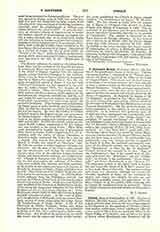

Osbald, King of Northumbria, d. 799. Symeon of Durham (Historia Regum) tells us that when Ecfwald, a pious and just king, took up the reins of government in Northumbria on the expulsion of Ethelred, Osbald with another eorlderman named Athelheard collected a force early in 780 at Seletune (probably Silton in the North Riding of Yorkshire), and set fire to the house of Bearn, whom Huntingdon and Wendover call the king’s justiciary. In 793 the deacon Alcuin addressed an affectionate but forcible letter to King Ethelred, Osbald, and Osberct, whom he calls most dear friends and children, urging them to flee from vices which lead to destruction and practice virtues by which we ascend to heaven. He points out the terrible lesson to be learnt from the iniquities and consequent destruction of former rulers. When King Ethelbert, who had been liberated from exile and reigned seven years, was murdered on April 19, 796, at Corbe or Corebrygge (Corbridge), Osbald the “patrician” was chosen by some of the nobles of his nation as king, but, after a reign of only twenty-seven days, deserted by all the royal following and the nobles, he fled and took refuge with a few others on the island of Lindisfarne. Eardulf was then recalled from exile and crowned in May at St. Peter’s, York, and reigned for the next ten years. Probably, when at Lindisfarne, Osbald received the letter sent to him in 796 by Alcuin. In this the latter states that for more than two years he had endeavored to persuade Osbald to assume the monastic habit and fulfil the vow he had taken; but now he had gained a still worse reputation and more unhappy events had befallen him. He suspects him further of the murder of Ethelred, besides shedding the blood of nobles and people alike. He urges him not to add sin to sin by attempting his restoration to power. It would be more to his shame to lose his soul than to desert his impious comrades. Rather he should endeavor to the utmost to gain the reward not only of his own conversion, but that of others who are in exile with him. Finally he begs him frequently to have his letter read to him. Alcuin‘s advice bore fruit and Osbald with some brethren sailed from Lindisfarne to the land and king of the Picts. He became an abbot and, on his death, was buried in the church at York.
S. ANSELM PARKER

